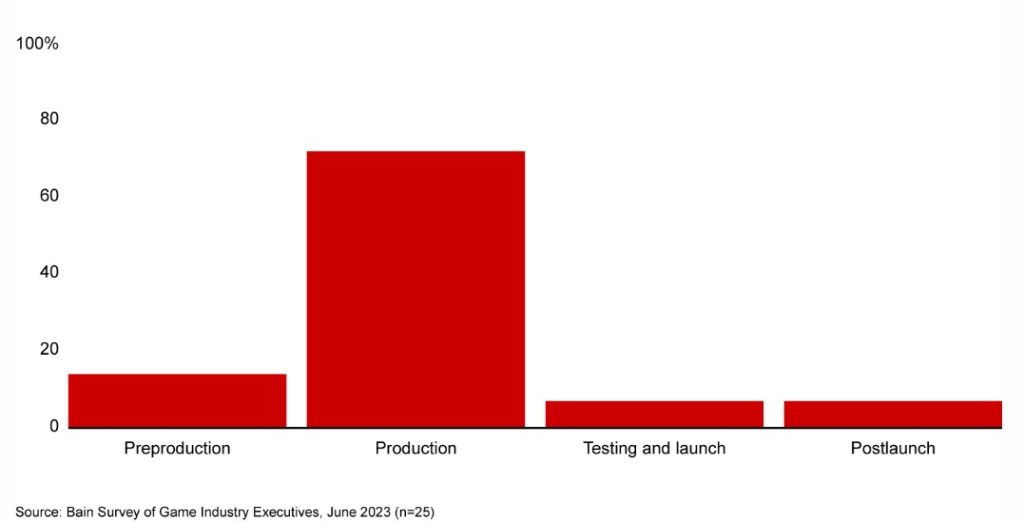
Video gaming’s executive level optimism about the benefits of artificial intelligence ring loud and clear in a new report from Bain & Company, which found that bosses believe that within 5 to 10 years, AI could manage more than half of game development .Only a small minority say they are moderately or extremely concerned about the rise of generative AI.
In the report, Bain spoke with gaming industry executives about the “potential and the challenges of generative AI for their industry”. The report found that most decision-makers have high expectations for generative AI, going so far as to anticipate that “it to have a greater effect on their business than other transformative technologies, such as virtual reality or augmented reality and cloud gaming”.
Executives say they see AI as a way to expand their productions, as opposed to cutting costs, with only 20 percent believing in a cost benefit. One finding that may raise eyebrows among gaming workers, is that 60 percent don’t expect generative AI to have a significant effect “on their talent model or alleviate the industry’s critical talent shortage”.
Companies are already using AI to generate stuff like sample art during pre-production, but they expect the technology to move into later creative and production phases, including story generation and the interactions between players and NPCs, as well as in-game art and asset creation, such as playable maps.
Execs also see AI taking a role during in-game live events, such as player support. And, of course, they view it as a tool that players will use to generate their own content, either for fun or for resale.
Legal challenges
However, as others have warned, utilizing AI in game development is likely to trigger all manner of technological, creative and legal challenges, as well as significant pushback from workers who – whatever executives currently claim – are likely to be squeezed by computers taking on large parts of their jobs.
Reflecting the kind of statements often made by gaming execs today, the report found a general agreement that “the talent model will benefit by freeing up creatives from labor-intensive tasks, such as coding content for games”. It adds that “human creativity will remain the source of what makes a video game fun” including game design and gameplay mechanics.
Bain’s report is based on interviews with a range of executives, whose priority is generally to cut costs where possible. The report states that those companies that develop “a thoughtful ambition and approach will see the earliest success and mitigate potential risks from improper use of the technology”.
It goes on to warn: “Failing to deploy a disciplined approach to generative AI in the production process could create challenges around prioritization, resource allocation, and integration with existing processes.”
Nascent scene
Gaming companies are currently worried that the nascent AI scene will take a while to settle down. During this period, technological uncertainty and the rise and fall of early players will add to the general confusion. The report adds that “the landscape changes from week to week, no single player offers everything, and it’s not clear yet which company’s products are the best.”
Bain states: “Developer-publishers should carefully assess when to build in-house, when to partner with scale players within the ecosystem, and when to partner with smaller, niche players.”
Boston-based Bain is a management consultancy firm operating across a broad swathe of industries. Its report goes on to offer up advice to gaming companies, on how best to extract benefits from AI.
These include taking a “disciplined and proactive approach to generative AI” in which long terms goals are clearly agreed and elucidated, alongside”appropriate guardrails and governance [that] will improve return on investment and limit risk”.
Bain adds: “The core goal is still creating fun, engaging games. Generative AI can help in many ways, but overreliance could also make it a hindrance. More content and engagement in a game does not guarantee a better player experience.”
Top talent
In its conclusion, the report states: “It’s an exciting time for the video game industry. Games are getting bigger, development costs are ballooning, and it remains as hard as ever to retain top talent. At the same time, players’ expectations are rising, as they’re demanding more immersive experiences and a bigger role in creating those experiences. Now, generative AI enters the game. There’s plenty of hype, but there’s also incredible potential, which, if harnessed properly, can deliver massive benefits to players, creators, and publishers.”
In related news, Series AI yesterday announced that it has raised $7.9 million in seed funding for its plan to make and market AI development tools, mainly targeted at low-end tasks.
Series AI’s CEO Pany Haritatos issued a statement to GamesBeat: “We now know that in the hands of expert game makers, purpose-built generative AI editors can rapidly architect, shape and build new games and game worlds.
“A mature toolset will allow our team to explore brand new game systems, themes and mechanics in almost the same amount of time that it would take to describe them… We are building … a game authoring platform that is designed for innovation. In the hands of our expert game makers, we believe this technology will enable new category leading products without the compromises inherent in traditional game development.”
You can read Bain’s full report here.
Colin Campbell has been reporting on the gaming industry for more than three decades, including for Polygon, IGN, The Guardian, Next Generation, and The Economist.
 GameDaily.biz © 2025 | All Rights Reserved.
GameDaily.biz © 2025 | All Rights Reserved.